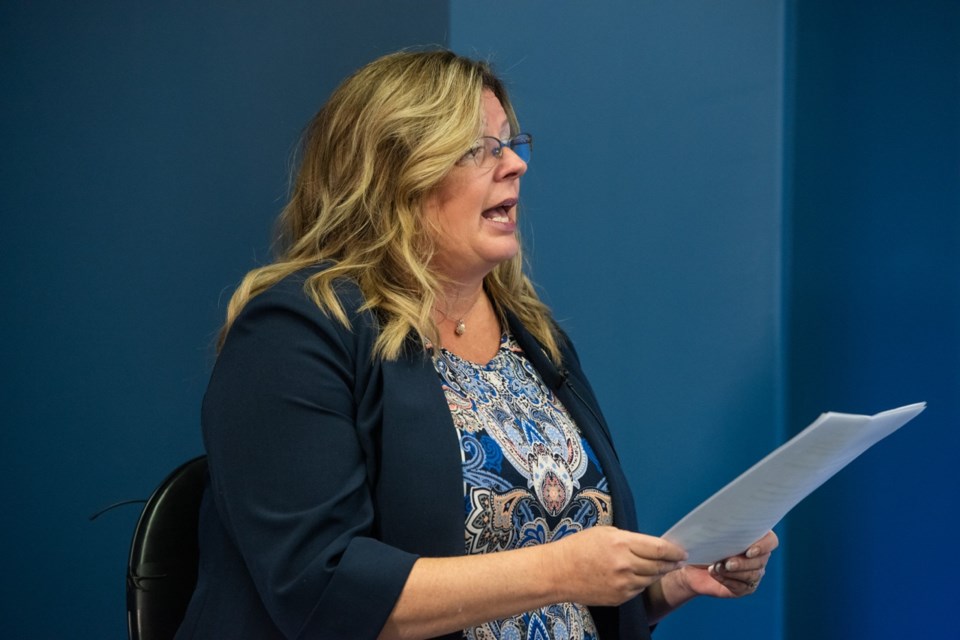The Saskatchewan Party continues to be the dominant party in provincial politics, and it continues to have a strong grip over southeast Saskatchewan.
The Sask. Party won a fourth straight majority government in Monday’s provincial election, winning or holding the lead in 50 of 61 ridings. When the provincial election was called, they had 46, while the opposition NDP had 13. Two seats were vacant.
In the Estevan constituency, Lori Carr of the Saskatchewan Party picked up 4,100 of the 6,623 votes cast, or 61.9 per cent of the popular vote.
Phil Zajac of the recently-formed Buffalo Party was second with 1,689 (25.5 per cent), Seth Lendrum of the New Democratic Party was third with 391 (5.9 per cent), Linda Sopp of the Progressive Conservatives was fourth at 329 (5.0 per cent) and Scott Meyers of the Green Party was fifth with 114 (1.7 per cent).
There are also 441 mail-in ballots that have yet to be counted in the riding, and those weren’t tabulated as of Mercury press time.
Those mail-in ballots won’t impact the results in Estevan, but could change results in some of the big city ridings, where results are close.
In an interview with the Mercury Monday night, Carr said she is looking forward to representing the constituency for a second term, and she was pleased to see another strong majority government for the Sask. Party.
“We did a lot of door-knocking. We door-knocked the entire constituency, all of the residents,” she said.
People shared a lot of concerns about the future of coal-fired power generation in the riding, especially with the pending retirement of Units 4 and 5 at the Boundary Dam Power Station.
“We all know that carbon capture and sequestration is something that works. It does take those emissions out of the air. It’s something that I want to be able to continue with.”
The decision on whether CCS technology will be applied to Unit 6 at Boundary Dam Power Station and for the Shand Power Station will be made in the next few years.
She also heard a lot of concerns about the need for a new Estevan Regional Nursing Home. The committee tasked with raising the local share for the project reached its goal in early 2015, but since then, Estevan has been stuck in the queue for long-term care projects.
“It’s just a matter of the province prioritizing which nursing homes get to go first. Unfortunately, within the province, there are several nursing homes that are in worse condition than the nursing home here in Estevan,” said Carr.
The support for the newly-formed Buffalo Party cut into her share of the popular vote from the 78 per cent she received in 2016. Carr’s share of the vote is the lowest for a Sask. Party candidate since Doreen Eagles received 51 per cent of the vote in 2003.
Carr noted the Buffalo Party had a big emphasis on support for coal power and for the oil and gas sector.
“It just shows me how important coal is for this community, and I think it was them talking and saying this is how important this is for us,” said Carr.
This campaign was very different from the one four years ago. Carr spent more time at public gatherings in advance of the 2016 election, but that wasn’t possible this time due to crowd restrictions due to COVID-19.
“Even going to coffee rows and different things, and the whole contact tracing piece, you don’t want to be seeing too many people face to face,” said Carr. “The door-knocking worked really well, because we could knock, step back six feet, you had your mask on all the time, and you knew that you were in that safe zone.”
Normally she would also shake hands and spend more time visiting people.
Carr had a campaign office on Fourth Street in Estevan this year, but spent election night at home with a few invited guests, since there is a 15-person limit on gatherings in residences.
Four years ago, her victory party was at the Estevan Elks Lodge.
Carr spent most of her first term as an MLA in cabinet, first as the minister of Highways and Infrastructure, and then as the minister of Government Relations, the provincial Capital Commission, and First Nations, Métis and Northern Affairs.
She said she would welcome the opportunity to retain the government relations role.
“We all work at the pleasure of the premier, so if the premier feels that I’ve done a good job and I can stay in cabinet, then that’s where I’ll be. If something happens that he decided to put someone else in and they get their turn, then that will not stop me from working any harder or fighting any harder for our constituency.”
In the Cannington constituency, with all 58 polling stations reporting, Daryl Harrison of the Saskatchewan Party won with 5,581 votes. Wes Smith of the Buffalo Party was second with 1,227, Dianne Twietmeyer was third with 617 and Jaina Forrest of the Green Party was fourth with 131.
Harrison replaces long-time Sask. Party MLA Dan D’Autremont, who announced in 2018 that he wouldn’t seek another term in the job. D’Autremont had been MLA since 1991.
A couple of other ridings had local connections.
In Moose Jaw Wakomow, former Estevan resident Greg Lawrence of the Saskatchewan Party was elected with 3,129 votes in his quest for a third term as MLA, about 850 votes votes ahead of Melissa Patterson of the NDP, who received 2,275 votes. There were 778 ballots sent in.
And in Regina Wascana Plains, former Estevan resident Mike Sinclair, running for the NDP, was defeated by incumbent Christine Tell of the Saskatchewan Party. Tell had 5,920 votes compared to 2,597 for Sinclair. There were 2,651 mailed-in ballots.




